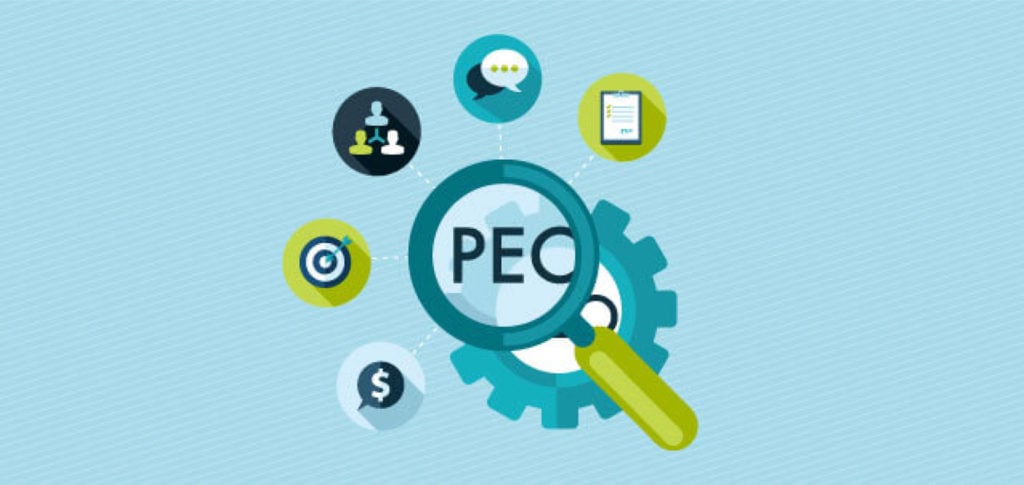
Understanding PEOs: Advantages, Risks, and Future Prospects – A Comprehensive Guide.
Explore the option of Professional Employer Organizations (PEOs) as a method to expand your team into Canada: the advantages, associated risks, and how they’re transforming to meet future HR needs.
What are the advantages and risks associated with PEO, and how can we mitigate any risk factors?
In today’s globalized and fast-paced business environment, companies are constantly on the lookout for innovative strategies to streamline their operations and manage their workforce more efficiently. Amidst a variety of solutions, one stands out prominently – the Professional Employer Organizations (PEOs).
PEOs, such as the expert PEO services at Pivotal Solutions, provide a comprehensive suite of services to businesses, specifically targeting small and medium-sized enterprises (SMEs), aiming to alleviate the often-overwhelming burden of HR functions such as payroll administration, employee benefits coordination, and regulatory compliance[1].
The model PEOs operate is one of co-employment. In this setup, the PEO acts as the employer of record for tax and insurance purposes. In contrast, the client company remains in control of the day-to-day management and operational roles of its employees.
This innovative arrangement opens up a myriad of advantages, particularly for businesses seeking to expand their workforce in unique regulatory environments like Canada. But as with any business strategy, it also comes with associated risks.

The Advantages of PEO
Several distinct advantages arise when a company partners with a PEO. Primary among these is the ability for businesses to focus on their core operations while delegating non-core administrative tasks to the PEO. With a deep pool of expertise in HR, payroll, and legal compliance, PEOs provide reliable support to businesses, tackling complex and often time-consuming functions and processes[2].
One significant edge that PEOs offer is the economies of scale, especially valuable for SMEs. PEOs combine the employees of numerous client companies under their umbrella. This enables them to negotiate for better rates on employee benefits such as health insurance, workers’ compensation, and retirement plans, something that would be unfeasible for individual SMEs.
In addition, PEOs can significantly ease a company’s expansion into new geographical markets, like Canada. Their local knowledge, experience, and expertise can help navigate the intricacies of local labor laws, taxation, and other regulatory requirements. With PEOs handling these complexities, the likelihood of legal or regulatory missteps, which could potentially lead to financial penalties or reputational damage, is substantially reduced.
The Risks Associated with PEO
While PEOs offer numerous advantages, they are not without potential risks that businesses should be mindful of. One of the primary concerns is the potential loss of control. While companies retain management of daily operations and employees’ roles, certain aspects, particularly pertaining to HR policies and processes, fall within the PEO’s control. Companies must therefore place their trust in the PEO to handle these areas effectively, aligned with the company’s culture and objectives[3].
Financial stability is another potential risk tied to the PEO model. When partnering with a PEO, businesses entrust them to accurately and punctually handle salaries, taxes, and benefits. This is why a reliable PEO partner is essential. HR companies, such as Pivotal HR Solutions — with 42 years of HR expertise — help mitigate these risks.
Finally, businesses must grapple with potential risks related to data security. PEOs handle a wealth of sensitive data, including employee personal information and payroll data. A breach in data security could have serious implications, including legal penalties and potential damage to a company’s reputation.
Risk Mitigation Strategies
Despite the inherent risks, several strategies can help businesses mitigate these concerns. Addressing the loss of control requires open dialogue and clear agreement on responsibilities and processes before entering a co-employment agreement. Clear contracts can help ensure alignment between the PEO and the company’s culture and strategic goals.
Regarding financial stability, thorough due diligence is crucial. Companies should review the prospective PEO’s history, stability and track-record, seek out customer referrals, and investigate the PEO’s industry credentials. This research will help to gauge the financial health and reliability of a potential PEO partner.
Lastly, data security risks can be mitigated by ensuring that the PEO follows best practices. These include encryption, secure access controls, and regular audits. It’s also important that the PEO has a robust response plan in place for potential data breaches.
The Role of PEOs in Canadian Expansion
As businesses consider expanding operations into Canada[4], they may be daunted by the country’s distinct labor laws, unique taxation structure, and other regulatory requirements. Here, a PEO can become an invaluable partner. Equipped with local knowledge and experience, PEOs can navigate these intricacies with ease, reducing the likelihood of legal or regulatory missteps that could result in costly penalties or reputational damage.
Moreover, PEOs provide local market insights and can assist with identifying potential challenges and opportunities. For instance, understanding the local workforce’s expectations and preferences can help design attractive employee benefits packages, thereby improving talent acquisition and retention.
Selecting the Right PEO Partner
Given the advantages and risks associated with PEOs, it’s evident that the choice of PEO partner is crucial. Businesses should consider several factors to make an informed decision.
Understanding the PEO’s expertise and track record is important. History and expertise are important. For example, Pivotal Solutions has decades of expertise in Canadian payroll services and HR Management and many years of PEO experience.
Companies should seek out PEOs with a strong history of delivering positive results for clients and ask for case studies or references. Depending on your customized needs, a full-service PEO such as Pivotal Solutions allows for flexibility in scaling up both services and scope. Track record and history provide assurance of the PEO’s ability to handle the company’s HR needs effectively and efficiently.
The financial stability of the PEO is also crucial. Ensuring that the PEO can meet all financial obligations will provide businesses with peace of mind that their employees’ salaries, taxes, and benefits are handled accurately and on time.
Also, the PEO’s data security measures should be scrutinized. This should include their approach to protecting sensitive information, their record in preventing data breaches, and their response plan in the event of a breach.
The Future of PEOs
The evolution of Professional Employer Organizations (PEOs) is ongoing, transforming in tune with the dynamic global business environment. Pivotal HR Solutions has led with PEO and EOR solutions both, with a wide array of options for companies looking to expand.
The PEOs of today are moving beyond their traditional roles, incorporating cutting-edge technology into their operations to better serve their clients and prepare for the future[5]. Several key trends are discernible that hint at the future trajectory of PEOs.
One major trend is the increasing integration of technology in PEO services, which promises to generate more robust and automated solutions for HR functions. Today’s PEOs are heavily invested in digital transformation, leveraging advanced software and platforms to streamline administrative tasks and improve accuracy. As technology continues to evolve, PEOs are likely to embrace even more advanced tools, improving their ability to handle HR tasks efficiently and effectively.
Furthermore, as remote work becomes more prevalent, PEOs are well-positioned to assist businesses in navigating the unique challenges associated with managing remote teams. This might involve providing advice on remote work policies, offering tools and platforms for remote team management, and assisting with the administrative tasks associated with employing remote workers.
Finally, there’s an increasing emphasis on the PEOs’ role in promoting employee wellness. The future of PEOs is likely to see more comprehensive wellness programs, including mental health support and preventative health initiatives. Such programs can boost employee satisfaction and productivity, making them a valuable addition to the PEO offering.
Conclusion
PEOs undeniably offer a host of benefits for businesses, enabling them to navigate HR functions more efficiently and providing a robust platform for expansion into new markets. However, as with all strategic business decisions, it’s still important to weigh the potential risks that accompany these advantages.
Loss of control over certain aspects of business operations, financial instability of the PEO, and potential data security breaches are all areas that businesses must consider and address to manage these risks effectively. The good news is, with the right risk mitigation strategies in place, businesses can go a long way in protecting themselves.
Clear contracts delineating responsibilities, thorough financial due diligence, and stringent data security practices are some of the proactive measures businesses can adopt to leverage the benefits of a PEO while minimizing potential pitfalls.
In conclusion, a well-informed and strategically planned partnership with a PEO can be a game-changer for businesses, particularly SMEs, looking to optimize their operations and explore new growth opportunities. The key is in understanding both the advantages and risks, and implementing effective mitigation strategies to create a partnership that is both advantageous and secure.
Sources and References
- NAPEO (National Association of Professional Employer Organizations)
“What is a PEO?”
https://www.napeo.org/what-is-a-peo
- ADP
“Benefits of a PEO for small business”
- Sonary
“5 Risks To Be Aware Of When Choosing A PEO | Sonary”
https://sonary.com/content/5-risks-to-be-aware-of-when-choosing-a-peo/
- Skuad
“Professional Employer Organization (PEO) in Canada | Canada PEO”
https://www.skuad.io/peo/canada
- MarketWatch
“2030, PEOs (Professional Employer Organizations) Market Growth | Future Prospects and Competitive Analysis”


 Our HR solutions experts can recommend the right mix of HR outsourced services to make your entry into Canada easier.
Our HR solutions experts can recommend the right mix of HR outsourced services to make your entry into Canada easier.  Pivotal Employment Management Services co-hires your workforce, simplifying entry of your business in Canada.
Pivotal Employment Management Services co-hires your workforce, simplifying entry of your business in Canada. 















